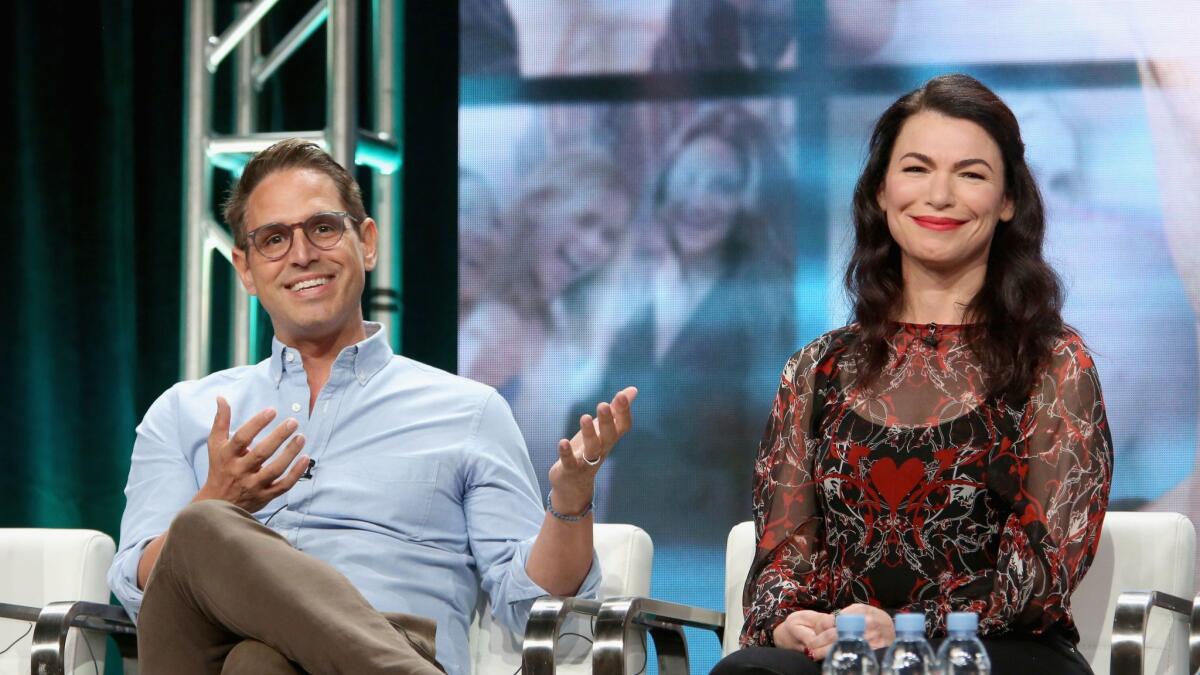For ‘You’ executive producer Sera Gamble, a drama built on online obsession just clicked
The new Lifetime drama “You” is a tale of modern love that will make you rethink your next Instagram posting.
The psychological thriller, based on Caroline Kepnes’ best-selling 2014 novel of the same name, stars “Gossip Girl” alum Penn Badgley as Joe Goldberg, a book store clerk-social media creeper who becomes enamored with Beck, an aspiring writer played by Elizabeth Lail (“Once Upon a Time”) whose path he crosses while on the job.
Joe takes the kind of social media sleuthing most of us are guilty of to alarming stalker levels in his quest to strategically get closer to the object of his affection.
The series, from Greg Berlanti (“Riverdale,” “Arrow”) and Sera Gamble (“The Magicians,” “Supernatural”), premieres Sunday. And Lifetime has already handed out an early Season 2 renewal.
Ahead of the show’s premiere, The Times spoke with Gamble about the stalker drama, her own relationship with social media, and how the tale stands against the backdrop of the #MeToo movement.
Before working on the series, how would you describe your relationship with social media?
I think my relationship has always been cautious. I am, by nature, a fairly private person, and I think I am just old enough that ... something feels slightly unnatural to me about the level of sharing that happens increasingly on social media. I understand that is cultural — the evolution of our culture. It just sort of is what it is. I don’t even really have a ton of judgment about it. I don’t think it’s inherently better to be more or less private. In certain ways it can bring us a lot more understanding and intimacy, but it also brings a lot of dangers, so I wrestle with those.
The only thing I would say about it is, in 2018, being active on social media is really a part of my job. It’s a part of the job of almost everybody associated with the show and it’s a part of your job. So there’s also this inherent tension where I’m being professionally encouraged to share more of myself online, both my work and stuff that will direct people to see the things we’ve made together but also give insight into me as the person who wrote it. Everything seems to be inching us towards a world where privacy is completely redefined and sort of doesn’t exist, the way that we feel it today.
My Facebook account is just for friends, and Twitter and Instagram are public. That was also an evolution; everything started private. I started not really knowing why they would be public. Right around the time Twitter was really becoming a thing I was working on the show “Supernatural,” which is sort of famous for having a very vocal fandom. Jumping into the middle of that fray, I didn’t feel like I had the bandwidth to do that and run the show, so I waited, and the people who were working publicity for the network encouraged me to just sit it out if I wanted to. But by the time I arrived at “The Magicians” and now “You,” everyone has all been marketing, and publicity sort of presumed that we would all be tweeting actively— live tweeting, posting behind the scenes on Instagram, so everything became public when “The Magicians” got picked up.
Everything seems to be inching us towards a world where privacy is completely redefined and sort of doesn’t exist, the way that we feel it today.
— Sera Gamble, executive producer of Lifetime’s “You”
There is the expectation to build a persona or a brand.
Yeah. When I went into it, I thought that this had aspects of a cautionary tale and that there was an aspect to the character of Beck — that she was a bit careless, that she was young, she was a little attention-seeking, she craved the “likes,” as so many people do.
Then as we got into writing it, it became so clear to me that she was caught in the middle of something that really was not of her own making. Wanting to be a writer, wanting to have herself out there professionally. Even supporting herself as a yoga instructor just to make it through the day, to pay her rent. These are now professions where you are expected to have a social media presence, so I think it’s disingenuous to watch the show or talk about the character Beck and say, “Well, you know, she’s a little shallow, she’s a little taken in by social media.” No, she’s a smart woman who understands what’s required of her in this day and age in order to put herself out there and have any success.
On the flip side, have you been the Joe character before? Have you found yourself going 52 weeks deep on someone’s Instagram?
Yes, absolutely. I’ve never broken into anyone’s apartment like Joe, but I have definitely checked people out. In fact, I consider it to be sane and to be due diligence, really, when you meet someone new, to Google them. I’m someone who wants to be prepared — certainly professionally I really want to be prepared. If I’m going into a meeting I tend to Google the person I’m meeting with. But, also, I get a little curious about exes sometimes or I’ll hear something about a friend I’ve fallen out of touch with and then I’ll find myself in their Instagram from 2015. That has occurred once or twice on a Sunday night. I’m a naturally nosy person, it’s sort of why I’m a writer. And also, it’s there. It’s there and it’s tempting and I don’t always have the discipline to walk away and do 20 minutes of transcendental meditation instead of seeing who my ex-boyfriend is dating.

Do you view this as a love story and, if it is, what is it saying about where we’re at right now?
I do. I view it as a twisted love story. I view it as us getting underneath the love stories we’ve all been consuming and loving for our whole lives. If you just turn the romantic comedy score off while you watch the romantic comedy, it’s alarming how much Joe Goldberg behavior exists in all of our touchstone film. I talk about this with the author, Caroline Kepnes, a lot. She watched “You’ve Got Mail” a lot when she was writing the book. I was very taken by that movie when it came out. I remember really liking it and feeling it was very romantic, being swept up by it. [But] he kind of destroys her life in that movie. The movie I probably brought up the most in the writer’s room were the teen movies that were so epic in my imagination when I was a kid. Like “Say Anything” and “Pump up the Volume,” right? The early Christian Slater movie. “Say Anything” — that boombox moment I think for a generation of women is the most romantic thing.
But let’s talk about what he’s actually doing in that moment. She has said no and he is outside her window in the middle of the night holding this boombox. There’s a difference between love stories on TV and in cinema and what is healthy in a love relationship in real life. Intellectually I think we know the difference, but I also think that our hardwiring has been affected by the romances that we revere. That’s what we’re trying to get to the heart of over the course of this season in “You,” that this is what happened to Joe Goldberg. This is how he digested and integrated all of that information about what a good man is, what a romantic hero is and how hard you should pursue the girl.
That is a primary purpose of the show...to look at what’s really going on underneath the tropes that we have embraced as a culture.
— Sera Gamble, executive producer of Lifetime’s “You”
There’s a lot of narration in the series. We’re in his head, while still feeling like we’re in her shoes. Talk about finding the balance in that dynamic.
It’s an interesting tool, and as a screenwriter I was trained never to rely too heavily on voice-over. You don’t want to explain something that you can show. Being inside Joe’s head and hearing his raw, unfiltered thoughts is so much a part of the book and so much of the addiction of the book. So much of what is delicious and sticky about the book is that we are hearing his thoughts and we’re observing how he interacts with people and at the same time we know the truth inside of his head. We wanted to capture that; it’s one of the unique things about the show. What it really meant was that this became a unique collaboration with Penn Badgley. He often recorded voice-over before he ever shot the scene, or he was shooting a scene with no dialogue on the day and then he would go in and do a lot of voice-over. It gave us the flexibility to write ... voice-over that was very comprehensive and then allow his performance to shine through.
Is there concern, though, in today’s climate that it’s the kind of character the audience won’t want to spend time with?
I think the current climate is pretty perfect for this show, actually, because we are talking about the same thing that you’re talking about. The conversation that we’re having right now around the #MeToo movement, for example, and really just the bigger conversation about the relationships between the genders right now. That is a primary purpose of the show, to take a hard look at that. To look at what’s really going on underneath the tropes that we have embraced as a culture. If we’re going to have a real deep conversation and we’re also going to make a lot of art and entertainment about what expectations our culture is putting on women and about what women are “falling victim to,” I think it’s necessary to look at men as well. I call this a cautionary tale for men.
Twitter: @villarrealy
More to Read
The complete guide to home viewing
Get Screen Gab for everything about the TV shows and streaming movies everyone’s talking about.
You may occasionally receive promotional content from the Los Angeles Times.







